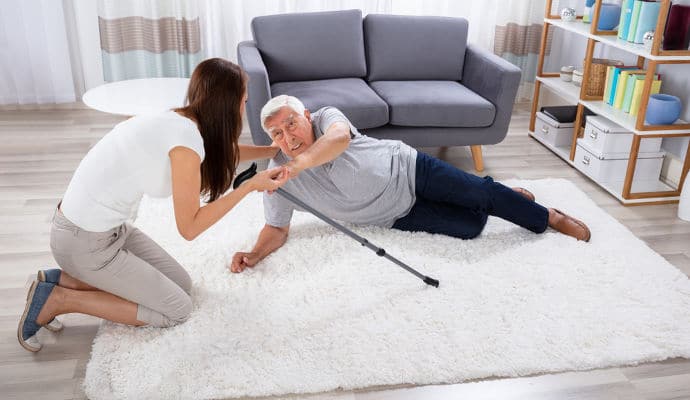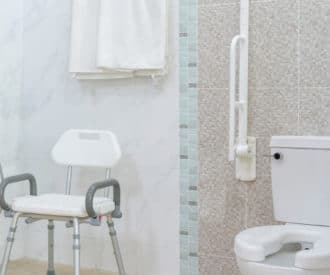
As we age, the risk of falling increases. But in an older adult, a fall doesn’t just cause physical injury. It can also cause a loss of confidence, which can then lead to more falls in the future. Here, ElWell shares 4 steps that help older adults take control and regain confidence after a fall.
When an older adult falls, we’re usually most concerned about any physical injuries and don’t often consider the emotional impact of the fall.
For older adults, falling often makes them feel less able on their feet.
And if they fall often or if a fall caused serious injuries, that could understandably cause a fear of falling.
So, to avoid falling at all costs, they reduce their level of activity or make other changes to their lifestyle.
But did you know that this fear of falling can actually lead to an increased risk of falls?
That’s because they’re less likely to be leading an active lifestyle in order to avoid situations that might cause a fall (like going for walks, taking the stairs, or exercising regularly).
Choosing to be less active can weaken the muscles that are needed for strength and balance – the muscles needed to prevent falls.
The good news is that it is possible for seniors to reverse this fear of falling.
Here are four steps to helping an older adult regain confidence after a fall.
1. Talk about the fall in a sensitive manner
Understand their concerns by speaking about the fall – don’t avoid the subject.
Listen to their worries to show that you’re taking them seriously.
Together with their input, use these conversations to identify why the fall happened and consider possible solutions to reduce future falls.
Help them see the fall more objectively, not just as an act that has caused anxiety or reduced their independence.
Maybe they tripped on a curb, so a walking stick could help give more support in the future.
Perhaps they just felt their muscles or balance give way and would benefit from some simple strength and balance exercises?
2. Set reasonable goals
To overcome their loss of confidence, work together to determine an achievable goal to work towards – something small and manageable, which can later be built upon.
This might be “I want to walk a circle around the entire garden on my own in 6 weeks” or “I want to firmly hold the handrail and walk steadily down these stairs in three weeks”.
3. Use measurable targets
Work together to set smaller targets which lead to the end goal.
Taking the above example of walking around the garden, help them plan what would be needed to achieve this goal.
For example, how far would they need to walk each week and who will help support them and prevent any falls while they’re in “training” and need help with balance?
4. Evaluate
When the goal date arrives, evaluate their progress.
How did they do? Did they achieve the goal?
If they didn’t reach their goal, what prevented that from happening and what did they achieve instead?
Encouragement is essential, so remember to recognize your older adult’s hard work and accomplishments and show your ongoing support.
Recommended for you:
- Increase Senior Independence with This Fall Risk Checklist
- Home Modifications for Seniors: A Room-by-Room Guide for Safety and Independence
- Prevent Falls in Seniors with This Helpful Conversation Guide
Guest contributor: Nancy Farmer is a physiotherapist with an interest in elderly rehabilitation. She focuses on providing valuable information at ElWell to help older adults improve their well-being.
This article wasn’t sponsored and doesn’t contain affiliate links. For more information, see How We Make Money.
[optin-monster slug=”yxbytm35zhsdfopnw7qk”][optin-monster slug=”jvhyplxmb4umsjazxecn”]
About the Author

Connie Chow
Connie was a hands-on caregiver for her grandmother for 20 years. (Grandma made it to 101 years old!) She knows how challenging, overwhelming, and all-consuming caring for an older adult can be. She also knows how important support is — especially in the form of practical solutions, valuable resources, and self-care tips.





Ref: Falling
It probably isn’t taking place at present, but the NHS has a 24 week course for “Fall Prevention” You need to be nominated by your GP
I took part in it last year, after several false over matter of months and it worked wonders for my self-confident and stability.
Can recommend it to anybody
Thanks for sharing! This sounds like a great program for people living in Britain.